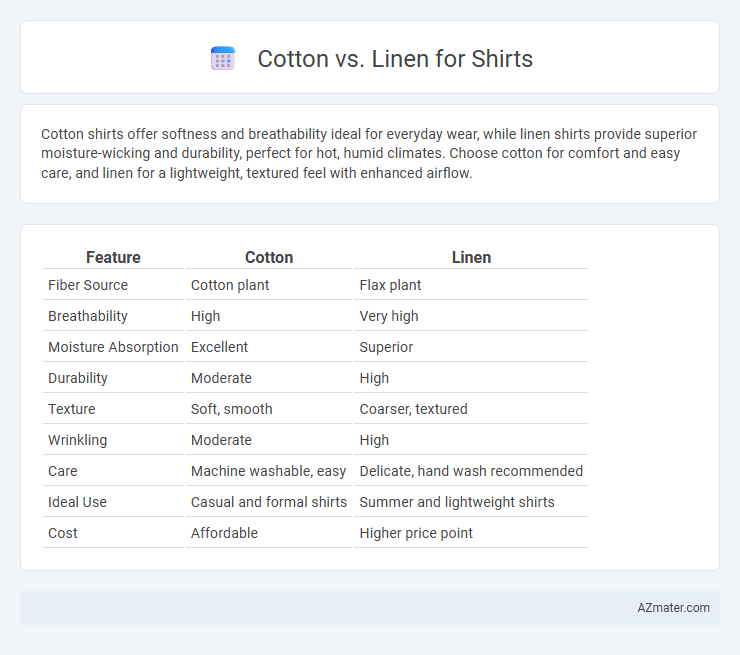Cotton shirts offer softness and breathability ideal for everyday wear, while linen shirts provide superior moisture-wicking and durability, perfect for hot, humid climates. Choose cotton for comfort and easy care, and linen for a lightweight, textured feel with enhanced airflow.
Table of Comparison
| Feature | Cotton | Linen |
|---|---|---|
| Fiber Source | Cotton plant | Flax plant |
| Breathability | High | Very high |
| Moisture Absorption | Excellent | Superior |
| Durability | Moderate | High |
| Texture | Soft, smooth | Coarser, textured |
| Wrinkling | Moderate | High |
| Care | Machine washable, easy | Delicate, hand wash recommended |
| Ideal Use | Casual and formal shirts | Summer and lightweight shirts |
| Cost | Affordable | Higher price point |
Introduction to Cotton and Linen Shirts
Cotton shirts are crafted from natural fibers known for their softness, breathability, and moisture-wicking properties, making them ideal for everyday comfort and versatility. Linen shirts, made from flax fibers, offer superior breathability and a distinct textured weave that enhances airflow, making them perfect for warm climates and casual elegance. Both fabrics are valued in fashion for their natural origin and ability to keep the wearer cool, but linen tends to wrinkle more easily, while cotton provides a smoother, more uniform appearance.
Key Differences Between Cotton and Linen
Cotton shirts offer softness, breathability, and excellent moisture absorption, making them ideal for everyday wear, while linen shirts excel in durability, natural texture, and superior airflow, perfect for hot and humid climates. Cotton fibers are shorter and smoother, resulting in a softer fabric, whereas linen fibers are longer and coarser, giving a distinct crispness and more prone to wrinkles. Maintenance also varies: cotton is easier to care for and resists shrinking better, while linen requires gentle handling and enhances its softness with repeated washing.
Comfort and Feel: Cotton vs Linen
Cotton shirts offer a soft, smooth texture that feels gentle against the skin, making them ideal for everyday wear in various climates. Linen shirts provide a crisp, breathable fabric with natural moisture-wicking properties, enhancing comfort during hot and humid weather. While cotton excels in softness and flexibility, linen stands out for its superior breathability and cooling effect, catering to different comfort preferences.
Breathability and Moisture-Wicking
Linen shirts offer superior breathability due to the fabric's loosely woven fibers, allowing increased air circulation that keeps the body cooler in hot weather. Cotton also provides good moisture-wicking properties by absorbing sweat efficiently, but it dries more slowly compared to linen, which naturally repels moisture and dries rapidly. For optimal comfort in humid conditions, linen remains the preferred choice as it balances breathability and moisture-wicking to reduce clamminess and maintain freshness.
Durability and Longevity Comparison
Cotton shirts offer moderate durability with a soft texture, but they tend to wear down faster due to frequent washing and pilling. Linen fabric is renowned for its exceptional strength and longevity, becoming softer and more comfortable over time without compromising its structural integrity. High-quality linen shirts outperform cotton in maintaining shape and resisting tears, making them a superior choice for long-lasting wardrobe staples.
Style, Appearance, and Texture
Cotton shirts offer a smooth, soft texture with a natural sheen that enhances their versatile style and crisp appearance, making them suitable for both casual and formal occasions. Linen shirts provide a distinct textured weave with visible natural fibers, giving a relaxed, breathable feel and a slightly wrinkled look that embodies effortless summer style. The lightweight, moisture-wicking properties of linen create a breathable fabric that contrasts with cotton's finer, denser weave, influencing the shirt's drape and overall aesthetic appeal.
Ease of Care and Maintenance
Cotton shirts are generally easier to care for, offering machine washability and quick drying, making them ideal for everyday wear and frequent laundering. Linen requires more delicate handling, often needing gentle wash cycles and careful ironing to prevent wrinkles and maintain fabric integrity. Both fabrics benefit from proper storage to avoid mildew, but cotton's durability makes it more forgiving in maintenance routines.
Environmental Impact and Sustainability
Cotton shirts generally have a higher environmental impact than linen due to their water-intensive cultivation and pesticide use, with conventional cotton requiring about 20,000 liters of water per kilogram produced. Linen, derived from flax plants, demands less water and fewer chemicals, making it a more sustainable fabric choice with lower carbon emissions and biodegradable properties. Sustainable linen production supports soil health and biodiversity, positioning it as a more eco-friendly alternative to traditional cotton in the textile industry.
Price Comparison: Cotton Shirts vs Linen Shirts
Cotton shirts generally offer a more affordable price point compared to linen shirts due to the widespread availability and lower production costs of cotton fibers. Linen shirts, made from flax fibers, tend to be pricier because of the labor-intensive harvesting and processing methods, as well as their reputation for durability and breathability. Consumers often find cotton shirts in the $15 to $50 range, while linen shirts typically fall between $40 and $100 or more, reflecting the premium quality and natural texture of the fabric.
Which Is Better for You: Cotton or Linen Shirts?
Cotton shirts offer softness, breathability, and moisture absorption, making them ideal for everyday wear and cooler climates, while linen shirts excel in durability, natural texture, and superior airflow, perfect for hot, humid conditions and casual, relaxed styles. Cotton is easier to care for with less wrinkle-prone fabric, whereas linen requires more maintenance due to its tendency to crease but provides a unique, lightweight feel. Choosing between cotton and linen depends on your climate, comfort preferences, and the level of fabric care you're willing to commit to.

Infographic: Cotton vs Linen for Shirt
 azmater.com
azmater.com